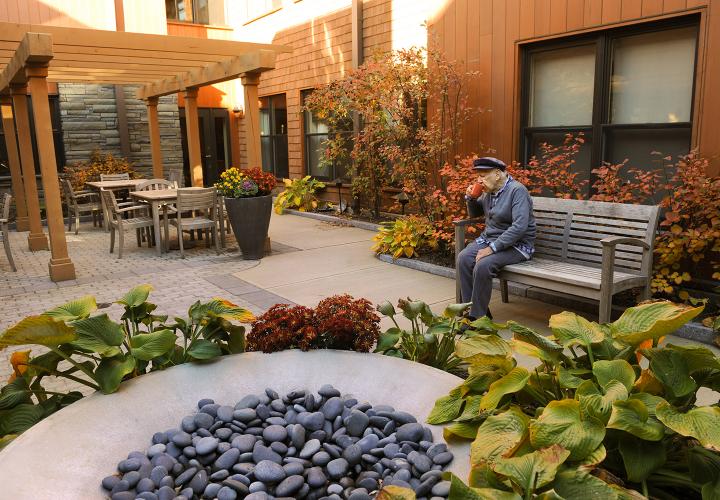Comprehensive Family Members Aid Readily Available with Alzheimers Care Charlotte
Comprehensive Family Members Aid Readily Available with Alzheimers Care Charlotte
Blog Article
Developing a Safe and Supportive Environment for Alzheimer's Treatment
The creation of a secure and helpful setting for individuals with Alzheimer's is critical in enhancing their top quality of life. This entails not only physical adjustments within the home, such as reducing dangers and including familiar components, however likewise the application of structured regimens and significant activities that accommodate their cognitive needs. Furthermore, understanding the psychological and psychological dimensions of treatment can substantially influence their complacency and link. Checking out these diverse techniques can expose essential understandings into efficient caregiving methods that may change the day-to-day experiences of both individuals and caregivers.
Recognizing Alzheimer's Requirements
Often, individuals with Alzheimer's illness exhibit a series of requirements that need tailored methods to care. As the condition advances, cognitive decline materializes in different means, influencing memory, reasoning, and also the ability to perform day-to-day tasks. Caretakers have to acknowledge these developing needs to give proper support and guarantee a better of life for those influenced.
One important facet of comprehending Alzheimer's requirements is identifying the value of regular and familiarity. Individuals usually find convenience in established patterns, which can lower anxiousness and complication. Caretakers should make every effort to create organized day-to-day routines that integrate purposeful activities aligned with the individual's abilities and rate of interests.
Additionally, reliable interaction is extremely important. People with Alzheimer's may battle to share themselves or comprehend complex language. Caretakers must utilize basic, clear language, use non-verbal hints, and technique energetic listening to cultivate understanding and link.
Finally, psychological and social demands can not be overlooked. Offering chances for social interaction and keeping partnerships can dramatically boost emotional health. Caretakers should encourage involvement in area tasks or household events, promoting a feeling of belonging and purpose. Recognizing these varied requirements is vital for developing a helpful care environment.
Designing a Safe Home
Developing a secure home for people with Alzheimer's disease is necessary to advertising and reducing threats freedom. The layout of the home must focus on security while permitting individual convenience. Remove potential hazards such as loose carpets, sharp things, and clutter, which can lead to falls or accidents. Guarantee that paths are well-lit and clear, as correct lighting minimizes disorientation and boosts flexibility.
Incorporating flexible functions is also vital. Set up grab bars in washrooms and near staircases, and take into consideration utilizing non-slip mats in wet areas. Additionally, utilizing different colors for floors and walls can assist in differentiating rooms, helping to alleviate confusion.
Experience is essential for individuals with Alzheimer's. Customizing the setting with acquainted objects and photographs can reinforce a sense of belonging and safety - Alzheimers Care Charlotte. It is additionally beneficial to have actually an assigned area for daily tasks, such as analysis or crafting, which can give framework to their day
Finally, carrying out a safe and secure outdoor space allows for secure exploration while linking with nature. By thoughtfully developing the home environment, caregivers can significantly boost the quality of life for individuals dealing with Alzheimer's disease.
Enhancing Interaction Abilities

Non-verbal communication, consisting of facial expressions, gestures, and touch, plays a vital role in conveying compassion and understanding. Preserving eye get in touch with and a tranquil disposition can improve the comfort level of the individual, promoting a sense of safety and security.
Moreover, it is important to exercise active listening. This involves being completely present, showing perseverance, and enabling the individual to share themselves without disturbance. navigate to this site Repeating might be necessary; caretakers need to be prepared to take another look at inquiries or topics, as people with Alzheimer's might fight with memory recall.
Furthermore, making use of visual aids or signs, such as photographs or familiar items, can promote acknowledgment and interaction. Ultimately, boosting interaction abilities is concerning developing trust fund and creating an environment where individuals really feel listened to, valued, and recognized, therefore enriching their lifestyle.
Urging Social Interaction
Promoting significant social interactions can greatly improve the wellness of individuals with Alzheimer's illness. Involving with others not only assists combat feelings of seclusion yet additionally promotes cognitive feature and psychological health and wellness. Structured social activities, such as team games, crafts and arts, or music therapy, produce opportunities for locals to get in touch with peers and caregivers, which can lead to improved mood and lowered anxiety.
Developing a welcoming environment that encourages socializing is vital. This can be attained by setting up communal rooms that facilitate communication, such as comfortable seating locations or task areas. In addition, incorporating view it acquainted and culturally appropriate tasks can stimulate memories and urge participation, allowing individuals with Alzheimer's to feel even more connected to their past experiences.
Furthermore, caregivers must be trained to identify and promote social engagement among citizens. Basic gestures, such as initiating discussion or helping with little seminar, can help individuals feel valued and included. On a regular basis scheduled social occasions need to correspond yet versatile, accommodating varying levels of capability and passion. By focusing on social interaction, we can considerably enrich the lives of those coping with Alzheimer's, fostering a sense of area and belonging.
Supporting Caretaker Well-being

To sustain caregivers, organizations should provide normal training and instructional sources to enhance their understanding of Alzheimer's condition and caregiving strategies. Giving accessibility to break care services permits caretakers to take essential breaks, decreasing stress and anxiety and fatigue - Alzheimers Care Charlotte. In addition, cultivating an area via support system can promote psychological sharing and the exchange of useful advice amongst caregivers, producing a network of shared assistance
Psychological wellness sources, such as therapy solutions, can likewise be important in addressing the emotional toll caregiving can take. By focusing on caregiver well-being, we produce a more sustainable caregiving environment that not only benefits the caretakers themselves however likewise enhances the total high quality of care received by individuals with Alzheimer's. Ultimately, sustaining caregivers is a crucial part in promoting a efficient try this site and thoughtful care setting.
Conclusion
In conclusion, the development of a supportive and safe environment for individuals with Alzheimer's is vital to enhancing their high quality of life. By focusing on safety through thoughtful layout, fostering emotional well-being with familiar elements, and promoting engagement with structured regimens, caregivers can dramatically influence the overall experience of those impacted by this condition. In addition, sustaining caregiver health is critical, as it eventually contributes to a much more thoughtful and reliable treatment setting.
Repetition might be required; caregivers must be prepared to take another look at questions or topics, as individuals with Alzheimer's may battle with memory recall.

Report this page